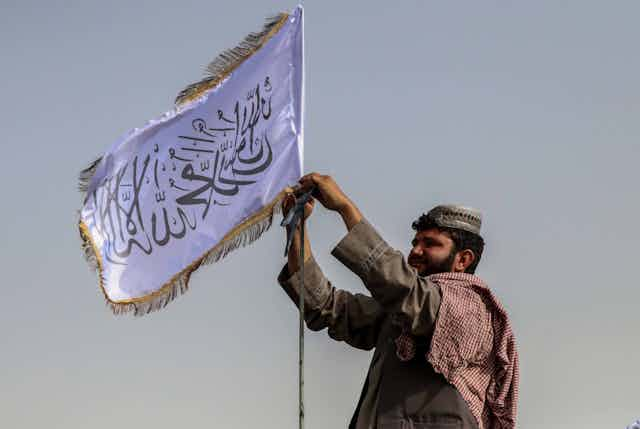The short version of events in Afghanistan is that Pakistan won and the international alliance led by the United States lost. Of course the story is not over and things could change – Iraq, for example, is a case of an intervention going very wrong but then returning to a more hopeful state of play.
The same could happen in Afghanistan too, but it is very unlikely. The scale of the loss and the degree of political exhaustion at home have left the key western players rethinking their position. They will now ponder the fact that Afghanistan offers them very little in terms of economic interests and also the fact that a wider strategic competition between China and the US will increasingly dominate the global chessboard.
Pakistan, which nourished the Taliban and played for time to maintain its sphere of influence, will thus durably “own” Afghanistan. It has the largest political and economic stakes in Afghanistan, it has more sway over the Taliban movement than any other outside player, and its longstanding ally, China, has already indicated its willingness to be of help.
Now, western partners, including Nato and the EU, must build on this reality. Their chief priority should be to support stability. It will not be the type of stability or political order for which they have fought for two decades, but a Pakistan-sponsored Taliban Afghanistan is what is on offer. The immediate goal should be to provide the Taliban and Pakistan a degree of support for their rule in return for a de-radicalised order: that is, an order that does not breed or sponsor international terrorism and engage in human atrocity.
Obviously, the US and Europe want neither the terrorism nor the refugees that stem from radicalism. Nor does Pakistan, which has borne a heavy cost from the radicalisation of its own society during the war, evidenced by domestic terrorism, political unrest and refugees.
Perhaps the Taliban regime will arrive at the same conclusion. If it is to govern, it needs resources and support, and it risks being at war not only with international society but also large segments of Afghanistan’s own society, which, of course, has changed in the 20 years since 2001. The population is more urban and better educated, and while the trend is not overwhelming, it is sufficiently strong to be a factor of restraint on the Taliban.
A continued low-intensity war with the Taliban might be tempting as a vindication of human rights values. And there will be political determination to redefine failure as a temporary setback. The Taliban could be squeezed financially, its domestic opponents could be armed, special operations forces could occasionally wrongfoot it and Pakistan could be prodded to lie low. But denial of failure is poor strategy. A protracted conflict on these terms would not and could not change the basic parameters that brought defeat in the first place.
Recognition and acceptance
A forward-looking policy must begin with an overt recognition that the Taliban and Pakistan have been victorious. It should then spell out the terms of western engagement. Having lost the war, the west must offer the Taliban development potential: diplomatic recognition and, with it, opportunities for finance and trade. The west should also offer to channel humanitarian aid into Afghanistan on terms that suit both sides. Pakistan, meanwhile, should be convinced that this recognition of its political sphere of influence is real and durable.
The first step should be to do everything possible – and for the losing side, that may not be a lot – to promote a Taliban-led government of transition that includes as many Afghan parties as possible. Power sharing eluded the republic erected in 2002-2004, and the international community never put this missing piece of the puzzle front and centre of its policy. But it is also worth reminding the Taliban and Pakistan that the alternative to power sharing is a very real risk of civil war. Ethnic groups in Afghanistan’s west and north have the capacity to organise armed resistance with the backing of outside powers. The west must, in this regard, appeal to the Taliban’s sense of history and buttress the reminder with a policy of recognition and development.

For its part, the west cannot accept international terrorism emanating from Afghanistan – and Europe, especially, cannot accept a continued flow of refugees for fear of further inflaming domestic politics. Western states would be right to signal that financial sanctions, covert military operations and other means of coercion could come into play if they are pushed.
The key, though, is to recognise these instruments for what they are: instruments of a (hopefully) orderly retreat, not means of continued war. The west cannot choose to oppose Taliban rule. That game is over. The real choice is between a retreat that furthers the hope of moderate Taliban rule and a retreat that, by opposing this rule, stokes further misery.
Facing facts
Time is of the essence. Afghanistan could be on the precipice of civil war while bewildered western governments seem to be mostly concerned with their public image in the face of human suffering. One can all too easily imagine that nothing much will happen in terms of western response – and certainly not a coordinated one.
Leading governments should defy lethargy and come together to define a policy of recognition and engagement. This would allow common institutions such as Nato and the EU to do what they do best: corral western interests and empower the voice of lead nations.
As tempting as it is to let go, or to grandstand and continue the war by other means, the right thing to do is to refashion policy and stay engaged, albeit on narrower and greatly reduced terms. This turnaround will ultimately define the parameters by which we will judge the high cost of Afghan policy post-2001.

